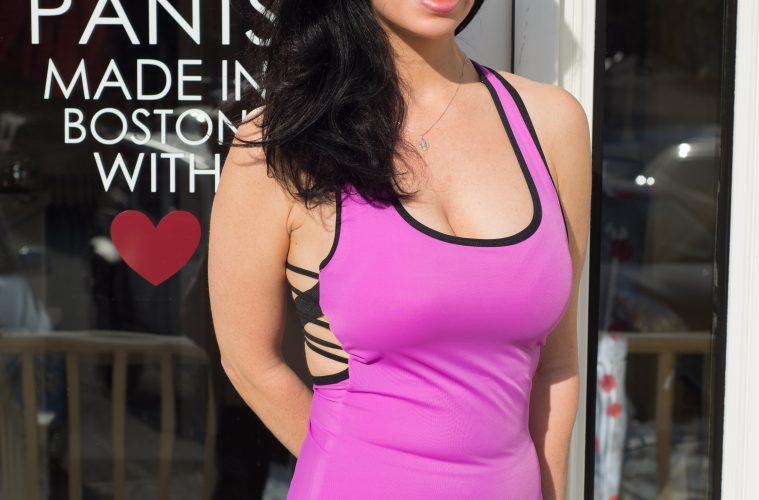Rebecca McCrensky, founder and CEO of Andover–based Altar Ego Global Fashions, has a fondness for telling stories. The Babson College MBA graduate once served as a buyer for Talbots and as vice president of merchandising strategy for PUMA. In time, she developed an idea for her own business—custom-designed activewear. For information, she turned to an Australian company specializing in digital imaging—they targeted a “Goth” audience. McCrensky also studied the tattoo industry.
That was the start of her story-filled venture. Moving through her newly opened shop (across from Whole Foods), McCrensky pulls pairs of leggings out to explain the inspiration for each. Her very first design—still a top seller today—features a Boldini painting of a Spanish flamenco dancer at the Moulin Rouge in 1905. The reason she was able to use the image, she explains, is because more than 70 years have passed since the artist’s death, making it free of copyright restrictions. She also has a pair decorated with a Monet print, with his signature on the ankle. She sourced the image from a Los Angeles–based photographer who shoots paintings in museums and then digitizes the photos for sale.
Another pair is printed with a Phoenix, which, of course, rises from the ashes. “That one is really compelling for me because when I worked at Talbots and PUMA, part of what I was frustrated with was that they were companies in trouble, and I was brought in to make changes; but they wouldn’t make any changes, so I started this business, and I felt like it was me coming out of the ashes and doing something that I am meant to do.” It is an image she feels speaks to a lot of people. “Life isn’t always logical…so this idea that you can continually reinvent yourself is meaningful.” A pair featuring black and white photographs of Paris and the Eiffel Tower is both romantic and, given the timing, sobering.
One of her most popular prints was inspired by artist Frida Kahlo and includes images of bones, roses, and birds. Kahlo’s work is copyright-protected, so McCrensky interpreted elements and symbols the painter frequently referenced. The design comes in green and gray. The gray is selling best, but as McCrensky points out, “Frida was all about color,” so she can’t bring herself to retire the green.
She also carries Capri-style and three-quarter-length leggings, one of which features an Aztec skull—another symbol of rebirth. She latched onto the idea that in Aztec culture both men and women can be warriors. McCrensky appreciates the fierceness and strength found when reinventing oneself. (Yoga practitioners are apt to relate to the concepts of warriorhood and strength, too.)
Her latest addition to the leggings line comes in a variety of solid colors with nude-backed mesh at the hips. It is intended for women who don’t want to make as much of a splash as some of her other designs make. “I want women to feel comfortable,” she says. “I want to give them options.” Next up? A “coffee-obsessed” theme depicting a map of the world composed of coffee symbols against a Carrera marble background. “The idea is: ‘Coffee is My World.’ It’s what gets me through the day,” laughs McCrensky. On every pair and in her logo, she includes a star she pulled from a compass on an antique map. It is a symbol, she says, that “goes back to the idea of storytelling and taking a journey.”
McCrensky hand-sketches her design ideas and shares them with a graphic designer, who digitizes the images, of which some are purchased, others are free, and some are built from scratch. “It’s really a kind of mixed media,” notes McCrensky. She starts with raw poly stretch fabric imported from Italy—it’s thick and nontransparent, which is a highly desirable characteristic when it comes to leggings. She has also recently discovered a cutting-edge material few industry professionals know about. “It’s 100 percent opaque, even on white,” she explains, adding that it provides a bit of structure and support.
McCrensky’s apparel is printed in Virginia, cut by Boston Lasers in Haverhill, and sewn at Lowell Sewing. She makes the point that sewing activewear seams is extremely difficult. “They have to be bionic seams to withstand pressure.” She went through a number of companies before finding Lowell Sewing, which specializes in that kind of stitch. (They used to sew for Nike.)
The leggings run $88 per pair. And McCrensky is right when she says they can’t be compared to mass-produced activewear found at big-box stores. “They are all custom-made from imported fabric and locally fabricated,” she says. “It’s art, literally.”
Speaking about her long-term goals for the business, she says, “I don’t want to have a brand that is solely superficial. I want it to be a very smart brand.” In time, she hopes to align herself with a charity. She mentions an organization that supplies sports equipment to inner-city youth, and another that provides books to young girls in developing countries. “I want to be someone who gives back, who walks the walk. I really want to make this an active-minded brand. I love what I do; I love the art behind it,” says the savvy businesswoman and designer, “but I want to do something that is socially impactful.”

